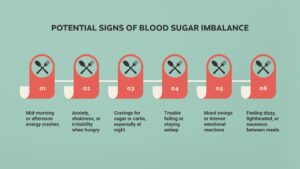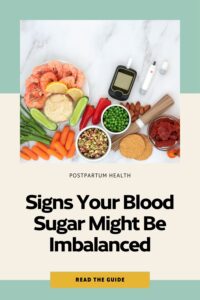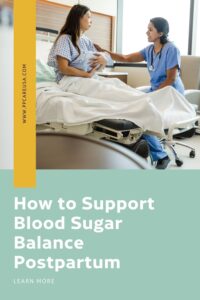You’ve probably heard about the importance of balancing blood sugar if you’re trying to avoid energy crashes or sugar cravings. But if you’re in the postpartum season, blood sugar balance does so much more than stabilize your mood or help you feel less “hangry.”
It plays a huge role in your hormone health, your emotional well-being, and even how your body recovers after giving birth.
Let’s break down the importance of managing your blood sugar postpartum—and what you can do to support it.
The Basics: What Happens to Blood Sugar After Birth?
During pregnancy, your body goes through major changes to support the baby—this includes increased insulin resistance. After birth, your insulin sensitivity shifts again, but not always in a predictable or smooth way.
At the same time, your body is going through:
- Massive hormonal shifts (goodbye, estrogen and progesterone)
- Disrupted sleep
- Increased stress
- Irregular eating habits (because let’s be honest, you’re lucky if you eat with two hands)
All of this creates the perfect storm for unstable blood sugar—and it often goes unchecked.
Blood Sugar and Hormone Health: What’s the Connection?
Here’s where it gets really important: your hormones are deeply connected to your blood sugar regulation. When your blood sugar is constantly spiking and crashing, it puts stress on your body and disrupts key hormone pathways.
Here’s how unstable blood sugar can impact your postpartum hormone health:
1. Cortisol (Your Stress Hormone)
Every time your blood sugar crashes, your body sees it as a stress event. To bring your blood sugar back up, your adrenal glands release cortisol and adrenaline.
If this happens frequently, your cortisol levels stay high—leading to:
- Sleep disturbances
- Increased anxiety or irritability
- Burnout and fatigue
Cortisol also competes with other hormones, like estrogen and progesterone, throwing your entire hormone balance off.
2. Progesterone & Estrogen
After birth, your progesterone and estrogen levels drop significantly. Your body needs time—and the right conditions—to restore balance.
But when blood sugar is unstable, it:
- Disrupts hormone production and communication
- Worsens estrogen dominance symptoms (like irritability, mood swings, and heavy periods)
- Makes it harder for your body to produce and regulate progesterone (a calming, anti-anxiety hormone)
Stable blood sugar gives your body the calm, steady environment it needs to recover hormonally.
3. Thyroid Function
Your thyroid plays a huge role in energy, metabolism, mood, and overall hormone balance. And it is extremely sensitive to blood sugar imbalances.
Unstable blood sugar puts stress on the thyroid and can contribute to or worsen conditions like postpartum thyroiditis or hypothyroidism.
4. Insulin Resistance Post-Pregnancy and Long-Term Health
Postpartum women are more at risk of insulin resistance—especially if gestational diabetes was present during pregnancy. Chronic blood sugar spikes can lead to longer-term hormone imbalances, metabolic issues, and inflammation if not addressed early on.
Signs Your Blood Sugar Might Be Imbalanced
You don’t need a continuous glucose monitor to tell you when something’s off. Common signs of blood sugar imbalance in postpartum moms include:
- Mid-morning or afternoon energy crashes
- Anxiety, shakiness, or irritability when hungry
- Cravings for sugar or carbs, especially at night
- Trouble falling or staying asleep
- Mood swings or intense emotional reactions
- Feeling dizzy, lightheaded, or nauseous between meals

How to Support Blood Sugar Balance in the Postpartum Season
The goal isn’t perfection—it’s about steady support for your body through gentle, consistent habits. Here’s what helps:
1. Eat Regularly
Try to eat every 3–4 hours, even if they’re small meals or snacks. Skipping meals can trigger a blood sugar crash, leading to stress and hormone disruption.
2. Prioritize Protein, Fat, and Fiber
Each meal and snack should have these three components:
- Protein (eggs, meat, Greek yogurt, beans)
- Healthy fat (avocado, olive oil, nuts, seeds)
- Fiber-rich carbs (vegetables, fruits, whole grains)
This combination slows digestion and keeps your blood sugar steady.
3. Don’t Start the Day with Sugar Alone
If you begin your day with a carb-heavy or sugary breakfast (like cereal, toast, or pastries), it can set you up for a blood sugar rollercoaster. Try eggs with veggies and avocado, or oatmeal with protein added in.
4. Stay Hydrated
Blood sugar regulation is harder when you’re dehydrated—especially if you’re breastfeeding. Aim for 80–100 oz of water a day and add minerals or electrolytes if needed.
5. Minimize Ultra-Processed Foods
These spike your blood sugar fast, then cause a crash. You don’t have to avoid everything, but be mindful of how they affect your energy and mood.
Is Your Blood Glucose Out of Control Post-Pregnancy?
If you’re constantly feeling exhausted, anxious, wired-but-tired, or disconnected from your body—it might not be “just postpartum.” It could be your blood sugar throwing your hormones off balance.
The good news? You can start feeling better with the right support.
At Postpartum Care USA, we help postpartum moms understand what’s happening in their body with root-cause lab testing, personalized nutrition support, and compassionate care.
You deserve more than “just hang in there.” You deserve to feel like yourself again.
Want to know if blood sugar imbalance is impacting your postpartum recovery?
Reach out to schedule a consult—we’d love to help you get answers and feel better.
Pin This for Later:



Postnatal Depletion
Meet the Team
Our Services
Supplements
A virtual healthcare clinic that helps postpartum mamas recover from postnatal depletion syndrome with a holistic approach.

Get in touch